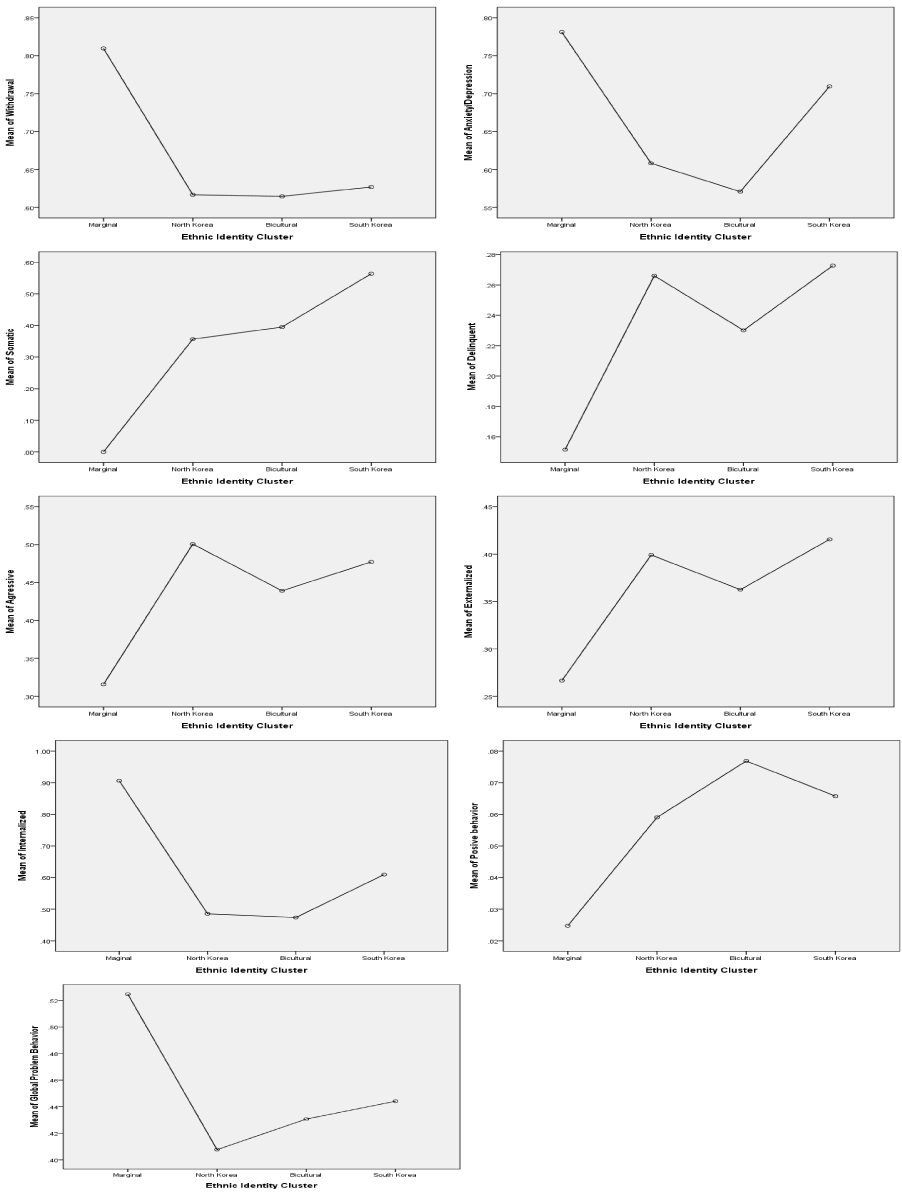J Korean Acad Community Health Nurs.
2012 Jun;23(2):144-154. 10.12799/jkachn.2012.23.2.144.
Problem behaviors, Cultural Identity and Acculturation of North Korean Refugee Youth
- Affiliations
-
- 1Department of Nursing, Korea National Open University, Seoul, Korea. anywayyoung@knou.ac.kr
- KMID: 2292804
- DOI: http://doi.org/10.12799/jkachn.2012.23.2.144
Abstract
- PURPOSE
The purpose of this study was to investigate the characteristics of problem behaviors, cultural identity and acculturation of North Korean (NK) refugee youth and to suggest an appropriate approach for helping them to adjust to our society based on these findings.
METHODS
The subjects were 117 NK adolescent refugees in Hanawon. Data were collected by a demographic questionnaire, Youth Self Report (YSR), the South-North Korean cultural identity.
RESULTS
Problem behaviors of NK refugee youth were the highest in anxiety/depression and withdrawal behavior and were followed by internalized behavior, aggressiveness, overall problem behavior, externalized behavior, delinquency and positive behavior in that order. Acculturation was the highest in 'separation' followed by 'integration', 'assimilation' and 'marginalization' in that order. No significant relationship was found between acculturation types and problem behaviors except positive behavior.
CONCLUSION
This study provides some important information that we have to develop specific strategies and interventions primarily focused on withdrawal, anxiety/depression, and internalization for the adjustment and mental health of NK refugee youth. It is necessary to explore further research related to cultural identity, acculturation processes, and the correlation between acculturation types and problem behaviors.
MeSH Terms
Figure
Reference
-
1. Achenbach TM. Manual for the Youth Self-Report and 1991 Profiles. 1991. Burlington, VT: University of Vermont.2. Ahn HS. Juggling two worlds: Ethnic identity of Korean- American college students. 1999. Philadelphia, USA: University of Pennsylvania;Unpublished doctoral dissertation.3. Baek HJ, Kil EB, Yoon IJ, Lee YR. A study on psychological adaptation of North Korean adolescent refugees in South Korea. Stud Korean Youth. 2007. 18(2):183–211.4. Berry JW. Goldberg NR, Veroff JB, editors. Psychology of acculturation. The Culture & Psychology Reader. 1995. New York: New York University Press;457–488.5. Ha EH. A validation study of the Korean youth self report (K-YSR). SookMyung J Child Study. 2005. 18:83–103.6. Ha EH, Lee SJ, Oh KJ, Hong K-EM. Parent-adolescent agreement in the assessment of behavior problems of adolescents: Comparison of factor structures of K-CBCL and YSR. J Child Adolesc Psychiatry. 1998. 9(1):3–12.7. Halcon LL, Robertson CL, Savik K, Johnson DR, Spring MA, Butcher JN, et al. Trauma and coping in Somali and Oromo refugee youth. J Adolesc Health. 2004. 35(1):17–25.8. Hazuda HP, Stern MP, Haffner SM. Acculturation and assimilation among Mexican-Americans: Scales and population-based data. Soc Sci Q. 1988. 69:687–706.9. Hyman I, Vu N, Beiser M. Post-migration stresses among Southeast Asian refugee youth in Canada: A research note. J Comp Fam Stud. 2000. 31(2):281–293.10. Hyun MS, Nam KA, Ahn YM, Kim MY. The recognitions of adolescents, parents, and teachers for female adolescents' problem behaviors. J Korean Acad Psychiatr Ment Health Nurs. 2005. 14:13–22.
Article11. Keum MJ, Kwon HS, Lee HW. The acculturation process of North Korean adolescents refugees. Korean J Couns Psychother. 2004. 16(2):295–308.
Article12. Kim HS. Cultural identity, acculturation, and mental health of immigrant youths-review study for Canada's immigrant youth population. J Korean Acad Psychiatr Ment Health Nurs. 2006. 15:384–391.13. Kim SJ. A study on the influences of the stressors from school on problem behaviors in middle school and high school students-focusing on the stress coping strategies. 2001. Seoul: Yonsei University;Unpublished master's thesis.14. Ministry of Unification, Inc. Demographic situation of North Korea refugee admitted and number in South Korea. 2007. 02. 01. Retrieved August 29, 2011. from http://www.unikorea.go.kr/CmsWeb/viewPage.15. Nash D. The course of sojourner adaptation: A new test of the U-curve hypothesis. Hum Organ. 1991. 50(3):283.16. Oh KJ, Ha EH, Hong KE, Lee HR. K-YSR. 2001. Seoul: Joongang Jeukseung.
Article17. Oppedal B, Røysamb E, Sam DL. The effect of acculturation and social support on change in mental health among young immigrants. Int J Behav Dev. 2004. 28(6):481–494.
Article18. Shen BJ, Takeuchi DT. A structural model of acculturation and mental health status among Chinese Americans. Am J Community Psychol. 2001. 29(3):387–418.19. Yang KM, Hwang ST. An initial study into the psychological adaptation of North Korean refugee adolescents in the first stages of their transition to life in South Korea. Stud Korean Youth. 2008. 19(2):333–358.
- Full Text Links
- Actions
-
Cited
- CITED
-
- Close
- Share
- Similar articles
-
- Influence of parenting efficacy, parenting stress, and acculturation stress on parent-child relations among North Korean refugee mothers
- A Study on Acculturation Stress and Stress-coping among North Korean Defectors
- Changes in health status of North Korean children and emerging health challenges of North Korean refugee children
- Children's Mental Health in Multicultural Family and North Korean Defectors in South Korea
- The Knowledge & Attitude on Tuberculosis by Parents of North Korean Refugee Children


